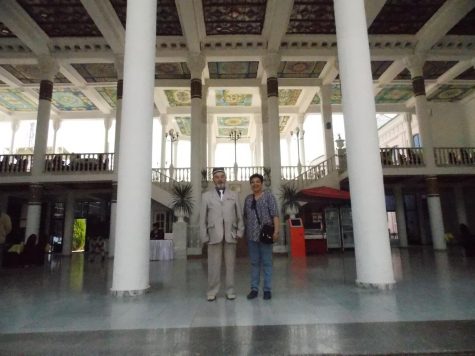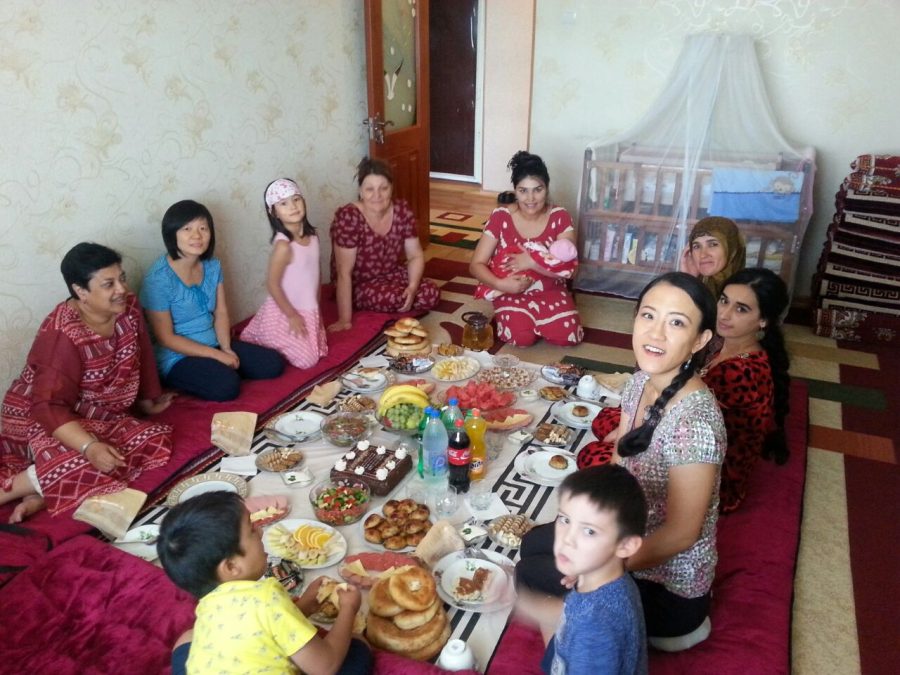Tea and Talk at Choykhana Rokhat: An Iconic Teahouse
May 8, 2023
Tea is the preferred beverage of most Asian countries, and they all have unique and interesting customs and traditions attached to the drinking of tea.
In September 2016 I took the two-and-a-half hour flight from New Delhi – capital of India, to Dushanbe – capital of Tajikistan, a jewel of a country in Central Asia.
Green tea (zeliony choy) being the national beverage of Tajikistan, tea (choy) is an important part of the country’s culture and accompanies every meal. Shirchoy, which is tea with milk, butter and salt, is usually drunk in winter, but the inhabitants of the colder Pamir and Alay mountainous regions drink it throughout the year.
In Tajik homes, it is customary to sit on kurpachis (thin mattresses stuffed with cotton wool) arranged around a dastarkhan (a large tablecloth spread on the floor) on which all the food is placed. I was privileged to be invited to a friend’s home for a meal and experience the legendary hospitality of the Tajik people. My attentive hostess ensured that my tea cup (piala) was never empty!
Not surprising then, that Choykhanas (teahouses) are popular all over the country. The traditional teahouses of Tajikistan originated from a nomadic culture where men would discuss important issues over tea, but later women also started frequenting these teahouses. Choykhanas are so popular that they are often the outdoor venues for musical evenings and even weddings in balmy weather.
Choykhana Rokhat located on Rudaki Avenue, the main street of Dushanbe, is the oldest and perhaps the most popular teahouse in the city, and among the iconic teahouses of the world. It was designed by a Russian architect who used traditional Tajik art and materials to decorate the walls, elegant pillars, and ceilings of this magnificent two-storied structure, which opened its doors for the very first time on June 22, 1958.
I visited Choykhana Rokhat with a Tajik friend early one afternoon, at a time when it was least likely to be crowded. We ascended the elegant stairs and walked around admiring the intricate designs and colors on the walls, columns and ceilings of the indoor restaurant. Then we sat at a table in the open gallery out front, sipping a refreshing cup of tea and biting into delicious ‘sambusas’ (similar to Indian ‘samosas’ – deep fried triangular dough envelopes filled with vegetables or minced meat), enjoying the fresh breeze and watching the people walking to and fro on the pavements of Rudaki Avenue.
To my left, I noticed a group of four elderly men sitting together at a table, talking and laughing. I imagined they were old friends and colleagues, now retired, who got together regularly at the Choykhana to reminisce over cups of tea, sambusas and shashliks (meat pieces pierced through skewers, cooked over charcoal or wood fires). They were all rather formally dressed in light colored suits and traditional Tajik hats, which are of black velvet and embroidered with silver thread. Each had at least one medal pinned to his coat. As they got up to leave, I asked permission to take a photograph of them. Three of them were bashful, and shook their heads, but one dignified gentleman asked where I was from.
When my friend told him that I was from a tea estate in India, he readily agreed to take a picture with “the lady from India who grows tea!” Then he joined us for another piala of tea. I asked about his medals, and he proudly explained that one had been awarded to him for gallantry and the other for service. I was fascinated but before I could ask for details, I happened to glance at my friend’s pained expression and realized that her translating skills were getting sorely tried! So, we thanked our new friend and took our leave of both the distinguished gentleman, and the iconic Choykhana Rokhat.

Dasgupta poses with a Tajik gentleman. Photo courtesy of Sarita Dasgupta


D.C. Hall • May 16, 2023 at 9:36 pm
Sarita, your adventures abroad are always so fascinating and inspiring. Thank you for sharing your many cultural experiences!